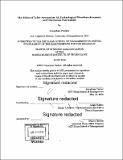The ethics of labor automation : AI, technological disenfranchisement, and libertarian paternalism
Author(s)
Packer, Jonathan,M.B.A.Sloan School of Management.
Download1119721906-MIT.pdf (7.373Mb)
Other Contributors
Sloan School of Management.
Advisor
Leigh Hafrey.
Terms of use
Metadata
Show full item recordAbstract
The capitalist economic landscape constantly reinvents itself to capture new value opportunities, in an endless innovative process of what Joseph Schumpeter called "creative destruction"'. Its next major event, hastened by the development of Artificial Intelligence (AI) and the emergence of highly accurate predictive behavioral data, is likely to assert itself in the labor economy. Labor costs often constitute the majority of a firm's operating expenses; indeed, the average wage share in highly developed nations currently hovers around 60% of GDP 2. Labor-automating technology is, for this reason, both anticipated and feared - the productivity enhancements of its adoption are likely to re-allocate trillions of dollars of revenue globally. Nevertheless, even in labor markets most susceptible to automation, Al is unlikely to completely replace any roles. Instead, its application will happen selectively in a process of human-machine teaming: fragmenting a single workflow into automation-feasible functions executed by machine intelligence, and a remainder of technically infeasible functions performed by a human worker. This technology also promises to radically transform organizations, replacing limited, reactive, human managerial insights with behavioral analytics that anticipate and directly modify worker experience. This paper will explore the ethical and democratic tensions between disenfranchising automation, invasive behavioral analytics, and economic growth. It will survey the evolution of contemporary labor from early narratives, to the vanquished, neoclassical notion of rational homo economicus, the development of modern organization theory, and the organizational psychology of workflow automation. Ultimately, it will consider the ethics of this transformation, its ramifications on corporate responsibility, and its threat to the worker and citizen's ever-shrinking creative franchise. The paper hypothesizes that the fragmentation of labor's creative discretion constitutes the total technological disenfranchisement of the worker, and its organizational automation ruptures the normal, reactive function of private, social, and democratic institutions. Through the lens of libertarian paternalism, or "choice architecture," it proposes a Third Way to correctively adapt to automation's inevitability. Drawing from this proposal and its survey of related theory, the paper suggests that former institutionalized labor norms have permanently deteriorated, and attempts to synthesize their replacement.
Description
Thesis: M.B.A., Massachusetts Institute of Technology, Sloan School of Management, 2019 Cataloged from PDF version of thesis. Includes bibliographical references (pages 77-83).
Date issued
2019Department
Sloan School of ManagementPublisher
Massachusetts Institute of Technology
Keywords
Sloan School of Management.